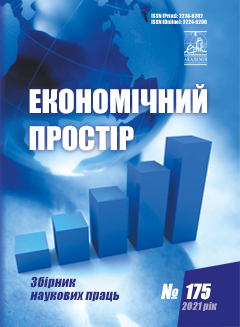ASSESSMENT OF THE IMF'S ACTIVITIES IN THE SYSTEM OF INTERNATIONAL ECONOMIC RELATIONS
Abstract
Globalization processes in the economy require proper management of financial resources of countries, because the regulation of the international financial market is one of the most important tasks for the successful development of the world economy and individual national economies. Since its inception, the International Monetary Fund has been designed to regulate the financial situation in the postwar period in the world. In modern conditions of information development of world economic systems, the role and importance of international financial organizations is changing. Therefore, the policy and activities of the IMF are increasingly criticized, which is justified and requires restructuring and reform of certain areas of the fund. The main task of the International Monetary Fund is to provide loans to countries that do not have sufficient foreign exchange reserves and are in a balance of payments deficit. The International Monetary Fund currently has 190 member countries. Each member country is obliged to pay contributions to the IMF, the amount of which is calculated taking into account the national economic potential. This entitles these countries to borrow money when needed. The IMF is the central institution of the international monetary and financial system. It is designed to avoid crises in this system by encouraging states to adopt sound economic policies; at the same time, it is also a fund that can be used by Member States in need of temporary funding to address balance of payments problems. The newly created IMF is designed to regulate monetary relations between countries and the implementation of financial assistance to member countries by providing them with short-term foreign currency loans due to currency difficulties due to imbalances in balance of payments.
References
Ксендзук В.В. Аналіз діяльності Міжнародного валютного фонду в умовах глобалізаційних економічних процесів. URL: http://www.irbis-nbuv.gov.ua.
Международный валютный фонд. Годовой отчет 2019. От стабилизации к устойчивому росту. URL: https://www.imf.org/external/pubs/ft/ar/2019/eng/assets/pdf/imf-annual-report-2019-ru.pdf.
Офіційний сайт Міжнародного валютного фонду. URL: http://www.imf.org.
Шинкар В.А., Яцко Л.Б., Яцко Г.В. Міжнародний валютний фонд та його вплив на глобальну макроекономічну політику. Науковий вісник УжНУ. 2016. № 6(3). С. 148–151.
Ksendzuk V.V. Analiz diyalnosti Mizhnarodnoho Valyutnoho Fondu v umovakh hlobalizatsiynykh ekonomichnykh protsesiv. URL: http://www.irbis-nbuv.gov.ua.
Mezhdunarodnyy valyutnyy fond. Hodovoy otchet 2019. Ot stabylyzatsyy k ustoychyvomu rostu. URL: https://www.imf.org/external/pubs/ft/ar/2019/eng/assets/pdf/imf-annual-report-2019-ru.pdf.
Ofitsiynyy sayt Mizhnarodnoho valyutnoho fondu. URL: http://www.imf.org.
Shynkar V.A., Yatsko L.B., Yatsko H.V. (2016) Mizhnarodnyy valyutnyy fond ta yoho vplyv na hlobalʹnu makroekonomichnu polityku. Naukovyy visnyk UzhNU, no. 6 (3), pp. 148–151.



